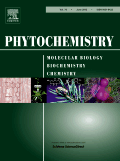
PHYTOCHEMISTRY
Scope & Guideline
Connecting Research and Nature for a Sustainable Future
Introduction
Aims and Scopes
- Natural Product Chemistry:
The journal primarily publishes research on the isolation, characterization, and biological evaluation of phytochemicals from various plant sources, including alkaloids, terpenoids, flavonoids, and glycosides. - Biosynthesis and Metabolic Pathways:
A core focus is on understanding the biosynthetic pathways of specialized metabolites, including the genetic and enzymatic mechanisms involved in their production. - Pharmacological Activities:
Research articles assess the pharmacological potential of plant-derived compounds, including their anti-inflammatory, anticancer, and antimicrobial properties, thus linking phytochemistry with medicinal applications. - Ethnopharmacology:
The journal covers traditional uses of plants in medicine, exploring the relationship between ethnobotany and phytochemistry, and emphasizing the relevance of indigenous knowledge in modern pharmacology. - Analytical Techniques:
Studies often incorporate advanced analytical methods such as mass spectrometry, NMR, and molecular networking to elucidate the structures and functions of complex natural products. - Environmental Interactions:
Research on the interactions of plants with their environment, including responses to herbivory and stress, is highlighted, showcasing how these factors influence phytochemical profiles.
Trending and Emerging
- Natural Product Drug Discovery:
There is an increasing trend towards the discovery of new drugs from natural products, particularly in the context of cancer and infectious diseases, highlighting the importance of phytochemicals in modern medicine. - Molecular Networking and Metabolomics:
The application of molecular networking and metabolomics for the comprehensive analysis of phytochemical diversity is on the rise, enabling researchers to uncover complex interactions and novel compounds. - Synergistic Effects of Phytochemicals:
Research is increasingly focusing on the synergistic effects of phytochemicals, exploring how combinations of compounds can enhance biological activity, which is crucial for developing more effective therapeutic agents. - Sustainable and Biotechnological Approaches:
There is a growing emphasis on sustainable extraction methods and biotechnological approaches for producing phytochemicals, including plant cell cultures and genetic engineering, which aim to reduce environmental impact. - Phytochemicals in Disease Prevention:
Emerging studies are investigating the role of phytochemicals in disease prevention beyond treatment, particularly in metabolic disorders and chronic diseases, which is reshaping the understanding of plant-based therapies.
Declining or Waning
- Traditional Phytochemistry:
There appears to be a waning interest in purely traditional methods of phytochemical extraction and analysis as the field increasingly embraces modern techniques and interdisciplinary approaches. - Single Metabolite Studies:
Research focusing on the bioactivities of single metabolites is diminishing, with a shift towards holistic studies that consider the entire phytochemical profile and its synergistic effects. - Environmental Phytochemistry:
Although environmental factors influence phytochemical diversity, studies focusing solely on environmental impacts without linking them to broader ecological or pharmacological implications are becoming less prevalent.
Similar Journals
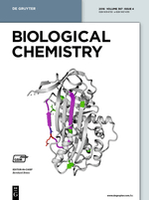
BIOLOGICAL CHEMISTRY
Advancing the Frontiers of Biochemistry and Molecular BiologyBIOLOGICAL CHEMISTRY, published by WALTER DE GRUYTER GMBH, is a premier journal based in Germany focusing on the ever-evolving fields of Biochemistry, Clinical Biochemistry, and Molecular Biology. With a robust reputation reflected in its top quartile rankings (Q1) within both Biochemistry and Clinical Biochemistry categories, and a commendable Q2 ranking in Molecular Biology for 2023, this journal stands as a vital resource for researchers, professionals, and students alike. The journal spans a rich history dating back to 1881 and embraces contemporary scientific discourse, ensuring accessibility to critical findings and advances that shape the biological sciences. Although it is not an open-access journal, its impactful contributions and relevant insights continue to serve the academic community. With its ISSN 1431-6730 and E-ISSN 1437-4315, BIOLOGICAL CHEMISTRY remains committed to fostering a deeper understanding of chemical processes in biological systems, driving innovation and research excellence into the future.

Applied Biological Research
Cultivating Knowledge in Applied Biological SciencesApplied Biological Research is a dynamic journal issued by the CENTRE ADVANCEMENT APPLIED SCIENCES, specializing in the interdisciplinary fields of biochemistry, genetics, and molecular biology. With its ISSN 0972-0979 and E-ISSN 0974-4517, this journal serves as a critical platform for the dissemination of peer-reviewed research that addresses pressing challenges and innovations within biological sciences. Although currently it does not adopt an Open Access model, it is dedicated to fostering academic discourse through rigorous publication practices. The journal's impact is underscored by its Scopus rankings, which place it in the 4th and 2nd percentiles in respective categories, emphasizing its emerging influence in the scientific community. Covering research from 2020 to 2024, Applied Biological Research is positioned as an essential read for researchers, professionals, and students seeking to stay at the forefront of biological research and application. Based in the beautiful region of Jammu & Kashmir, India, this journal is committed to advancing applied sciences through innovative research and outreach.
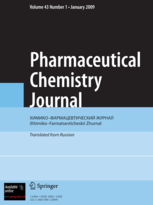
PHARMACEUTICAL CHEMISTRY JOURNAL
Exploring New Frontiers in Pharmaceutical Chemistry.Pharmaceutical Chemistry Journal is a pivotal publication in the field of pharmaceutical sciences, renowned for its in-depth articles and research findings. Published by Springer in the United States, this journal provides a crucial platform for researchers, students, and professionals dedicated to advancing drug discovery and pharmacology. With an ISSN of 0091-150X and an E-ISSN of 1573-9031, this journal has consistently aimed to promote scholarly communication and innovation within its scope since its inception in 1967. Despite its current Category Quartiles ranking of Q4 in both Drug Discovery and Pharmacology, the journal remains a valuable resource for disseminating new ideas and findings that contribute to the scientific community. Researchers benefit from the journal's commitment to high-quality peer-reviewed content, even in an environment where open access options are currently not available. As the field evolves, the Pharmaceutical Chemistry Journal continues to play an important role in shaping future advancements in drug development and safety.

CHEMISTRY OF NATURAL COMPOUNDS
Advancing Knowledge at the Intersection of Nature and ChemistryChemistry of Natural Compounds is a premier academic journal dedicated to the intersection of natural products and modern chemistry, published by Springer. Since its inception in 1965, this journal has published innovative research articles, reviews, and discussions that focus on the chemistry and biochemistry of natural compounds, with an emphasis on their applications in various fields including medicine, agriculture, and environmental science. Recognized for its contributions to the scientific community, the journal is indexed in key databases and holds a respectable impact factor that underscores its relevance in the academic landscape. Currently ranked in the Q3 category across multiple disciplines, including Biochemistry, Genetics and Molecular Biology, Chemistry, and Plant Science, it serves as a critical resource for researchers and professionals aiming to deepen their understanding of the complex interactions between natural compounds and biological systems. While not an open-access journal, Chemistry of Natural Compounds provides valuable insights and essential findings that can aid in advancing both theoretical and applied sciences for researchers, students, and industry practitioners alike.

BANGLADESH JOURNAL OF BOTANY
Bridging Science and Conservation in Plant StudiesBANGLADESH JOURNAL OF BOTANY is a prominent publication in the field of plant sciences, dedicated to advancing research and knowledge within the botanical community. Published by the BANGLADESH BOTANICAL SOC, this journal serves as a vital platform for researchers and scholars seeking to disseminate their findings related to plant biology, ecology, and conservation practices, particularly within the unique context of Bangladesh's diverse flora. With an ISSN of 0253-5416 and an E-ISSN of 2079-9926, the journal encompasses a wide scope of topics, reflecting interdisciplinary approaches in botanical research. Since its inception, with convergence periods from 1996 to 2001 and from 2003 to 2024, it has garnered recognition, positioned in the Q4 category in the Plant Science field with a ranking of #459/516 in Scopus, indicating its contribution to the field despite its developing impact. Operating within Bangladesh, at the UNIV DACCA DEPT BOTANY, the journal provides a crucial insight into the ecological and agricultural implications of plant studies in the region, catering to the needs of academics, professionals, and students eager to engage with contemporary botanical research.
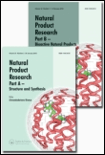
NATURAL PRODUCT RESEARCH
Elevating Research in Analytical and BiochemistryNATURAL PRODUCT RESEARCH is a distinguished journal published by Taylor & Francis Ltd, dedicated to advancing the field of natural product science through the dissemination of high-quality research. Established in 2003, this journal serves as a pivotal platform for scholars in Analytical Chemistry, Biochemistry, Organic Chemistry, and Plant Science, boasting an impressive categorization including Q2 in Plant Science and Q3 in the other disciplines for 2023. With a current Scopus ranking that highlights its significance within various scientific communities, NATURAL PRODUCT RESEARCH reflects the complexities and innovations associated with natural compounds and their applications. Researchers, professionals, and students will find valuable insights and breakthroughs that contribute to the understanding of bioactive compounds and their roles in health and environmental sustainability. Access options are available, ensuring that the latest findings are accessible to a global audience. As this journal continues to publish until 2024, it remains an essential resource for those at the forefront of natural product research.
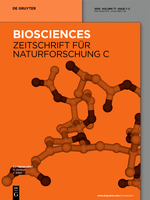
ZEITSCHRIFT FUR NATURFORSCHUNG SECTION C-A JOURNAL OF BIOSCIENCES
Advancing Knowledge in Molecular BiologyZEITSCHRIFT FUR NATURFORSCHUNG SECTION C - A JOURNAL OF BIOSCIENCES, published by Walter de Gruyter GmbH, stands as a significant contribution to the field of biochemistry, genetics, and molecular biology. With an ISSN of 0939-5075 and an E-ISSN of 1865-7125, this esteemed journal has been disseminating critical research since its inception in 1973 and will continue to do so through 2024. As a recognized leader in its category, the journal holds a Q3 rank in the comprehensive field of biochemistry, genetics, and molecular biology, placing it in the 57th percentile according to Scopus rankings. While it operates under a traditional subscription model, this publication serves as a vital repository of high-quality, peer-reviewed articles that illuminate new discoveries and ongoing innovations within biosciences. Researchers, professionals, and students alike will find valuable insights and cutting-edge research within its pages, making it an essential resource for anyone serious about advancing their understanding in this dynamic field.
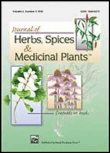
JOURNAL OF HERBS SPICES AND MEDICINAL PLANTS
Cultivating Insights into Medicinal FloraJOURNAL OF HERBS SPICES AND MEDICINAL PLANTS, published by Taylor & Francis Ltd, serves as a pivotal platform for researchers and professionals in the fields of Complementary and Alternative Medicine and Pharmacology. With an ISSN of 1049-6475 and E-ISSN of 1540-3580, this journal is dedicated to advancing the understanding of the therapeutic potential of herbs, spices, and various medicinal plants, and showcases high-quality, peer-reviewed research from 1992 to 2024. As of 2023, it holds a respectable Q3 ranking in both relevant categories, exhibiting its growing influence within the academic community. The journal is not open access, yet it remains a vital resource for those exploring the diverse applications and efficacy of plant-based therapies. Researchers and students alike will benefit from the journal’s commitment to disseminating innovative findings that can enhance the quality of life through natural remedies, thereby contributing significantly to the global discourse on herbal medicine.
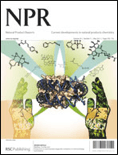
NATURAL PRODUCT REPORTS
Illuminating Pathways in Biochemistry and Drug DiscoveryNATURAL PRODUCT REPORTS, published by the Royal Society of Chemistry, is a premier interdisciplinary journal that specializes in the field of natural product chemistry. With an impressive impact reflected in its 2023 quartile rankings, it holds a Q1 status in key categories including Biochemistry, Drug Discovery, and Organic Chemistry, highlighting its significance and influence in these areas. The journal, which has been disseminating groundbreaking research since its inception in 1984, serves as a vital resource for researchers, professionals, and students dedicated to advancing the understanding and application of natural products in various scientific contexts. Although it does not offer open access, the journal provides a plethora of insightful reviews and seminal articles that contribute to the collective knowledge and innovation within the natural product community. With a commitment to excellence, NATURAL PRODUCT REPORTS continues to foster collaboration and inspire future breakthroughs in the field.

International Journal of Biology and Chemistry
Advancing Knowledge at the Intersection of Biology and ChemistryInternational Journal of Biology and Chemistry (ISSN: 2218-7979; E-ISSN: 2409-370X) is a distinguished peer-reviewed journal published by AL-FARABI KAZAKH NATIONAL UNIVERSITY, dedicated to advancing the interdisciplinary fields of biology and chemistry. This journal aims to foster a comprehensive understanding of biological systems and chemical processes, thereby promoting collaborative research and innovative methodologies. With a rigorous selection process and commitment to quality, the journal provides a platform for original research articles, reviews, and case studies that contribute to the scientific community's knowledge base. Although specific metrics such as H-Index and Scopus rankings are currently not listed, the journal continues to be an important resource for researchers, professionals, and students alike. By providing open access to high-quality research outputs, the International Journal of Biology and Chemistry is poised to make a significant impact in its field, bridging gaps between biological sciences and chemistry while encouraging groundbreaking discoveries.